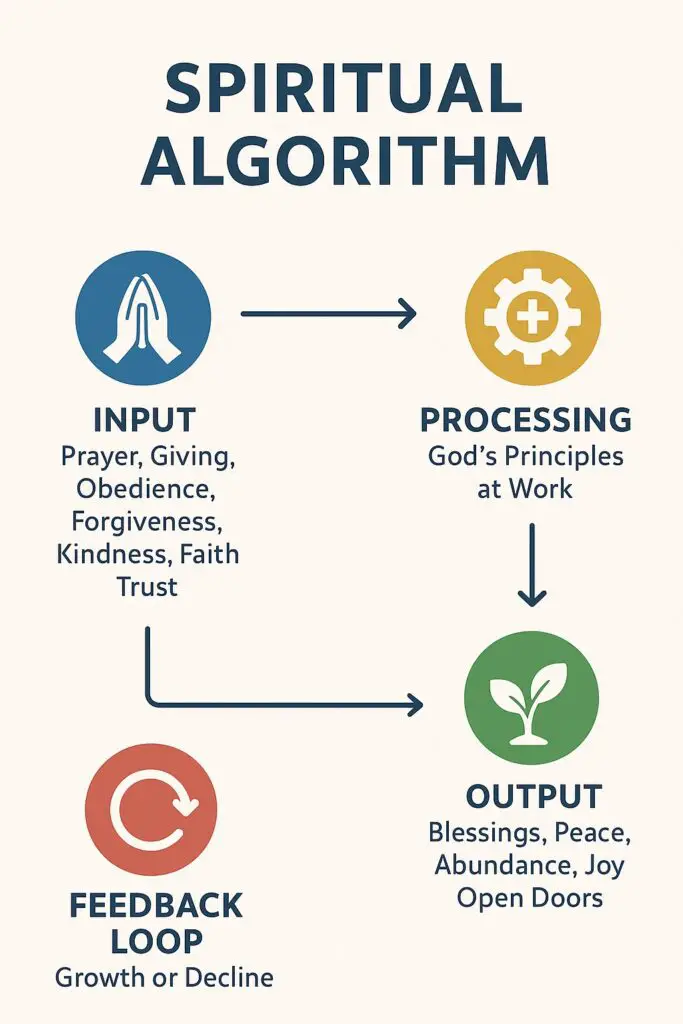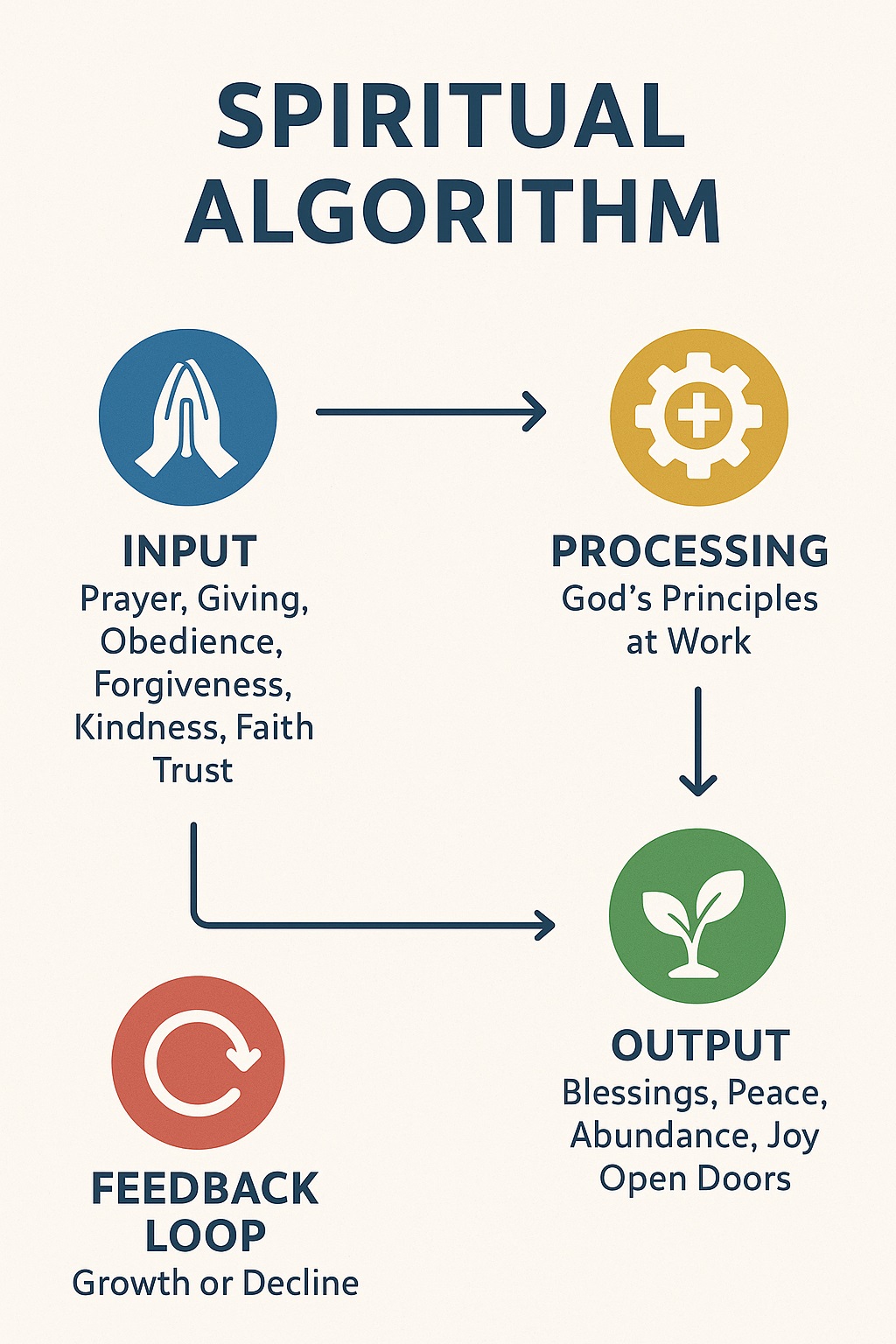The Importance of Giving
Creates Flow, Not Stagnation
Wealth is like energy or data: if it only accumulates in one place, it becomes stagnant.
Giving keeps resources circulating, opening new pathways for value to return.
Builds Networks of Reciprocity
Just as algorithms “learn” through interaction and feedback, giving builds trust networks.
People you help often become nodes in your network that later amplify opportunities back to you.
Why Giving Generates Wealth
Think of giving like an algorithmic feedback loop:
Input (Seed Action): You give (time, money, knowledge, kindness).
Processing (Network Effect): Your giving influences others, generating goodwill, trust, and opportunities. Output (Return): These networks eventually send back multiplied value (business, support, innovation, blessings).
Reinforcement (Learning Loop): Each cycle teaches you better ways to give, refine, and grow — just like machine learning models improve with more iterations.
Algorithm Analogy
Greedy Algorithm (hoarding): Focuses only on immediate gain; may miss bigger, long-term opportunities.
Generous Algorithm (giving): Sacrifices some resources now, but opens exponential possibilities, like compound interest or viral growth.
Reward Function: In human life, generosity aligns with spiritual and social laws that “reward” the giver.
Proverbs 3:9–10 says:

“Honor the LORD with your wealth, with the firstfruits of all your crops; then your barns will be filled to overflowing, and your vats will brim over with new wine.”
Honor the LORD with your wealth”
Honor here means to recognize God as the true source of your resources.
In the ancient world, wealth was measured in land, animals, crops, gold. Today, it includes money, skills, opportunities, time, and influence.
Honoring God means putting Him first in how you use your wealth — not just in words but in action (giving, tithing, helping the poor, funding Kingdom work).
This reflects trust: you are saying, “God, You are my provider, not my possessions.”
“Then your barns will be filled to overflowing”
Barns symbolize your storage, resources, and investments.
Overflow means abundance beyond what you can hold, Blessing beyond measure.
The promise is not only that God meets your needs but that He multiplies what you give, creating more capacity than you imagined.
It reflects a divine principle of multiplication: what you release returns in greater measure (Luke 6:38 echoes this).
And your vats will brim over with new wine”
Vats represent joy, celebration, and prosperity.
New wine symbolizes freshness, blessing, and spiritual vitality.
This isn’t just financial wealth, it’s fullness of life, peace, joy, and spiritual richness.
It shows that honoring God with wealth doesn’t just affect your wallet; it overflows into your whole life experience.
Algorithm Connection (relating to your earlier question)
This passage works like a spiritual algorithm:
Input: Give first fruits (honor God with wealth).
Processing: Trust and obedience activate God’s multiplication principle.
Output: Overflowing barns (material provision) plus new wine (joy, spiritual blessing).
Feedback Loop: The more you trust and give, the stronger the cycle of abundance becomes.
Proverbs 3:9–10 teaches that when you put God first with your resources — not last — you trigger a divine law of increase, ensuring that both your material needs and your inner life overflow with abundance.
What is an Algorithm?
In computing, an algorithm is a step-by-step process that takes input, processes it, and produces an output.
Algorithms follow rules, and their results depend on the quality of the input and the logic applied.
What is a Spiritual Algorithm?

A spiritual algorithm is the way God’s principles operate in life. Invisible but consistent laws that govern outcomes when you apply in life
It’s not about machines, but about the predictable, repeatable spiritual laws God built into creation.
The Flow of a Spiritual Algorithm
Input (Human Action & Heart):
Prayer, giving, obedience, forgiveness, kindness, faith, trust, etc.
Or negatively: greed, unforgiveness, pride, hate.
Processing (God’s Principles at Work):
These inputs move through divine laws:
Sowing & Reaping (Galatians 6:7)
Give & It Will Be Given (Luke 6:38)
Faith Produces Results (Mark 11:24)
Forgive & Be Forgiven (Matthew 6:14-15).
Output (Results):
Blessings, peace, abundance, joy, open doors.
Or consequences like emptiness, conflict, stagnation.
Feedback Loop (Growth or Decline):
Just like a computer algorithm improves with repeated data, spiritual results build momentum.
Example: consistent giving creates consistent abundance; consistent bitterness creates consistent loss.
Example of a Spiritual Algorithm in Scripture
Proverbs 11:24–25:
“One person gives freely, yet gains even more; another withholds unduly, but comes to poverty. A generous person will prosper; whoever refreshes others will be refreshed.”
Here’s the algorithm:
Input: Giving → Process: Divine law of multiplication → Output: Prosperity & refreshment.
Why This Matters
Understanding spiritual algorithms helps us see that life is not random.
Just as in coding, what you put in determines what comes out.
It shows us that spiritual laws are as real as physical laws (like gravity).
A spiritual algorithm is the divine system of cause-and-effect God built into the universe. When you align with it (through love, faith, giving, obedience), you trigger predictable blessings. When you fight against it, you trigger predictable losses.
